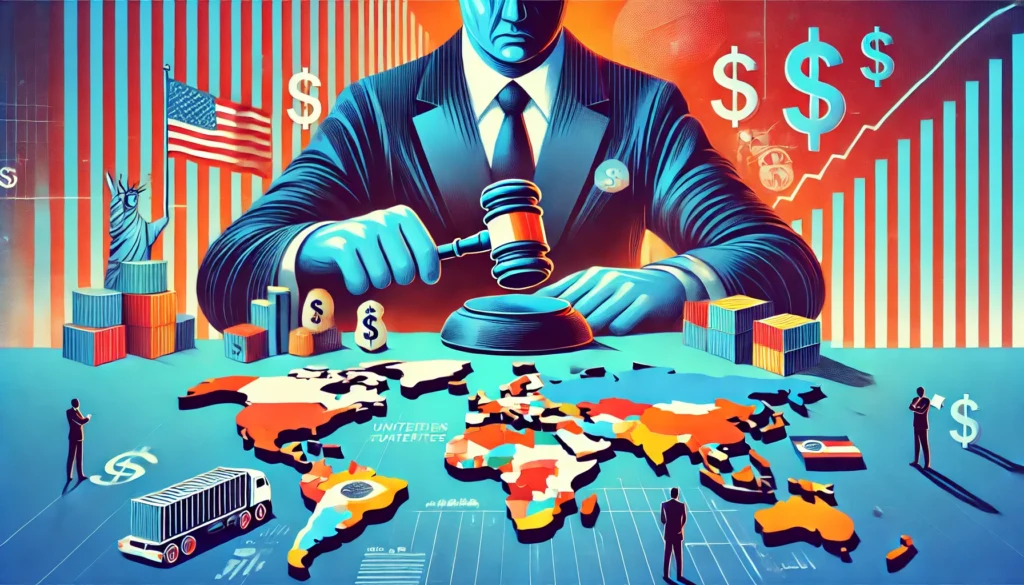President-elect Donald Trump has reignited debates over trade policies by pledging to impose tariffs on nations he accuses of exploiting the United States. His plans have sparked widespread backlash from global leaders, with countries like Mexico and Canada vowing to retaliate against harsh economic measures. Yet, recent polling reveals that Americans have distinct views on which nations truly deserve such penalties.
China: The Primary Target for Tariffs
According to a J.L. Partners poll conducted from January 10–12 among 1,009 registered voters, Americans overwhelmingly consider China the most deserving of strict tariffs. Only 20% of respondents believe China has engaged in fair trade with the U.S., while 59% think it has not.
This widespread sentiment is reflected in public support for action: 52% of voters favor tariffs on China, despite concerns about rising consumer prices. Many Americans see this as a necessary step to address what they perceive as China’s unfair trade practices, such as currency manipulation and intellectual property violations.

U.S. Allies Receive More Favorable Reviews
The survey shows that Americans view other trade partners more favorably. Half of the respondents believe the United Kingdom has treated the U.S. fairly in trade, while only 20% disagree. Similarly, Canada enjoys strong approval, with 53% saying it has acted fairly compared to 24% who think otherwise.
Political affiliation plays a significant role in these perceptions:
- 70% of Democrats view Canada’s trade practices as fair, compared to 40% of Republicans.
- Among Independents, 47% share a favorable view of Canada’s trade approach.
Japan and the European Union, which includes countries like France and Germany, also received relatively positive ratings. Nearly 46% of Americans believe these nations have treated the U.S. fairly, while only 25% disagree. Mexico, however, received more divided opinions: 39% of Americans view its trade practices as fair, while 32% do not.
Partisan Divides in Trade Views
The poll highlights significant differences in opinion along party lines. While 39% of voters overall believe Mexico has treated the U.S. fairly, only 25% of Republicans agree. In contrast, 52% of Republicans believe Mexico has been unfair. Among Democrats and Independents, however, more respondents believe Mexico has engaged in fair trade practices.
Despite these differences, there is notable bipartisan support for imposing tariffs in specific cases, even on countries deemed fair:
- 41% of voters support tariffs on Mexico, while 30% oppose them.
- 37% favor tariffs on Canada and the European Union, compared to 33% and 30% opposition, respectively.
Trump’s Trade Strategy
Trump’s proposed tariffs align with his broader “America First” platform, with a clear focus on China. During his campaign, he promised a 60% tariff on Chinese imports, later reducing this to 10% after the election. His administration has accused Beijing of exploiting U.S. markets, making it a central target of his trade policies.
Mexico and Canada have also faced criticism, with Trump threatening 25% tariffs unless these nations address his demands concerning drug trafficking and illegal immigration. Both countries have warned of retaliatory measures, raising fears of a trade war.
Economic and Political Implications
Economists warn that widespread tariffs on key U.S. trade partners could backfire, increasing costs for American consumers and businesses. Senator Ron Wyden (D-Ore.) has criticized these measures, arguing they function as hidden taxes that disproportionately impact low- and middle-income Americans.
During a Senate confirmation hearing, Wyden confronted Trump’s Treasury Secretary nominee, highlighting concerns that tariffs would hurt American workers and small businesses. The nominee defended the strategy, claiming that currency adjustments and market dynamics would mitigate price increases. However, many remain skeptical, noting that tariffs historically lead to higher costs for consumers.
Public Skepticism and Policy Challenges
Trump has suggested creating an “External Revenue Service” to oversee tariff collections. However, critics argue that this would duplicate the work of existing agencies like U.S. Customs and Border Protection, which already manages import duties and trade enforcement. Establishing such an agency would also require congressional approval, complicating Trump’s plans.
As Trump prepares to implement his ambitious trade agenda, questions remain about its effectiveness. Will tariffs boost the U.S. economy and strengthen domestic industries, or will they lead to retaliation and economic uncertainty? The coming months will likely determine whether Trump’s approach delivers on his promises.
Survey Insights
The J.L. Partners poll, with a margin of error of ±3.4%, provides a snapshot of public opinion on trade policies. While Americans largely agree on China’s unfair practices, opinions vary widely on other trade partners and the broader impact of tariffs.
Conclusion
Trump’s tough talk on trade has reignited debates about fairness and the role of tariffs in protecting American industries. While China is viewed as the top target for harsh measures, opinions on other allies are more nuanced. The president-elect’s actions in the coming months will have significant implications for the U.S. economy and its relationships with global trade partners.



